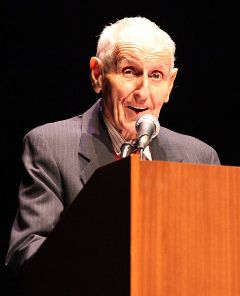
pathologist known for his lifelong efforts to legalize
physician-assisted suicide, died Friday of complications from a
kidney-related illness in a Detroit-area hospital. He was 83.
Known as “Dr. Death,” Kevorkian
spent decades fighting for euthanasia to be legal. He served eight
years of his original 10-25 year sentence in prison for murder, and
was arrested multiple times for helping kill 130 patients commit
suicide between 1990 and 1999. Kavorkian used injections, carbon
monoxide and the infamous suicide machine he built from scraps for
$30 to aid in the death of patients with terminal conditions such as
ALS, malignant brain tumors and multiple sclerosis.
When asked by CNN’s Anderson Cooper in a 2010
interview how it felt to take a life, he explained: “I didn’t do
it to end a life. I did it to end the suffering the patient’s going
through. The patient’s obviously suffering—what’s a doctor
supposed to do, turn his back?”
“Many of the victims on whom Jack Kevorkian preyed were people with disabilities
who had no terminal illness; one was simply old. In at least five cases
autopsies were unable to confirm any disease at all,” observed Burke J. Balch,
J.D., director of National Right to Life’s Robert Powell Center for Medical
Ethics.
Most believe his practices to be too
radical, but the controversial doctor did have some supporters. However, his critics and supporters typically agree on one
thing: Due to his advocacy for the terminally ill’s right to choose
how they die, “hospice care has boomed in the U.S., and physicians
have become more sympathetic to patients’ pain and more willing to
prescribe medication to relieve it,” The New York Times
reports.
Kavorkian believed dying should be a an
intimate and dignified process, and said this was something most
terminally ill patients are denied.
In March 1996, a California United
States Circuit Court of Appeals ruled that mentally competent,
terminally ill adults have a constitutional right to die with the
help of medical experts and family members. The first federal
endorsement of its kind, this was a large achievement for Kavorkian.
Oregon, in 1997, became the first state
to make it legal for physicians to prescribe lethal medications to
assist terminally ill patients in ending their lives.
The only other states that have
legalized physician-assisted suicide are Washington and Montana.
Although he did not largely impact the U.S. legal system, he was
influential in raising public awareness about euthanasia and the
suffering of the terminally ill.
After winning multiple trials,
Kavorkian was convicted of second-degree murder on March 26, 1999.
The trial was held six months after he videotaped himself injecting
Thomas Youk, a patient suffering from amyotrophic lateral sclerosis
(Lou Gehrig’s disease) with the drugs that caused Youk’s death. The
tape was aired on “60 Minutes” in November of 1998.
“You had the audacity to go on
national television, show the world what you did and dare the legal
system to stop you,” said District Judge Jessica R. Cooper, who
presided over the trial. “Well, sir, consider yourself stopped.”
Kevorkian was released from prison on
parole in June 2007 after promising authorities he would not assist
any more suicides.
Dr. Kavorkian has garnered a lot of
national attention, from newspapers to television, and his story was even turned into a movie in
2010. Al Pacino, who played “Dr. Death” in HBO’s You Don’t
Know Jack, said he was gratified to “try to portray someone as
brilliant and interesting and unique” as Dr. Kevorkian and that
it had been a “pleasure to know him” in his Emmy acceptance
speech.














































